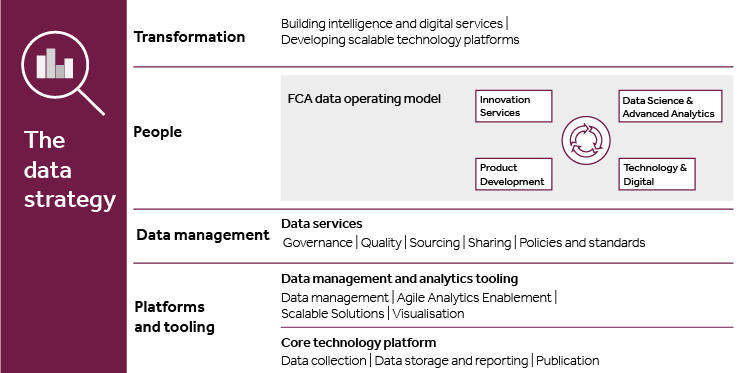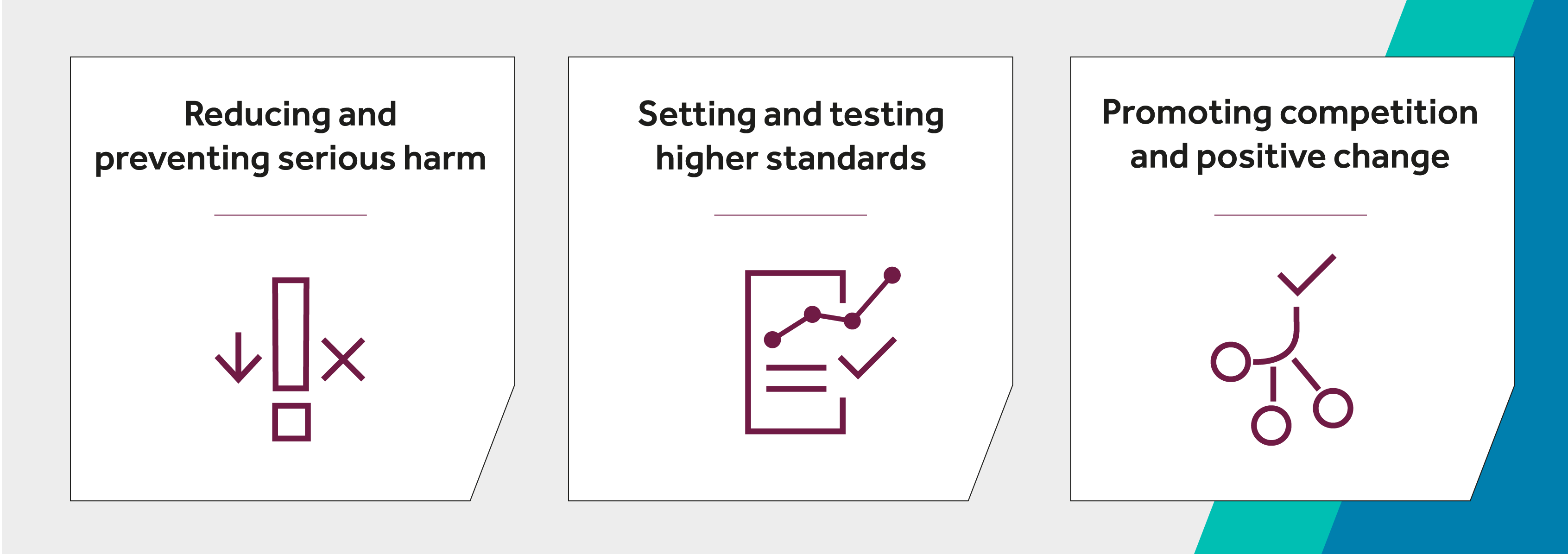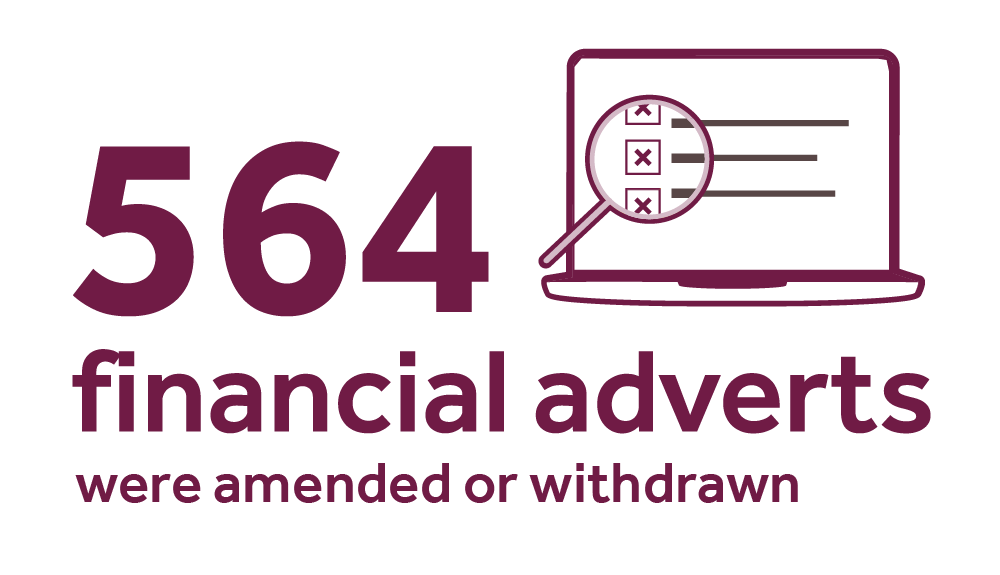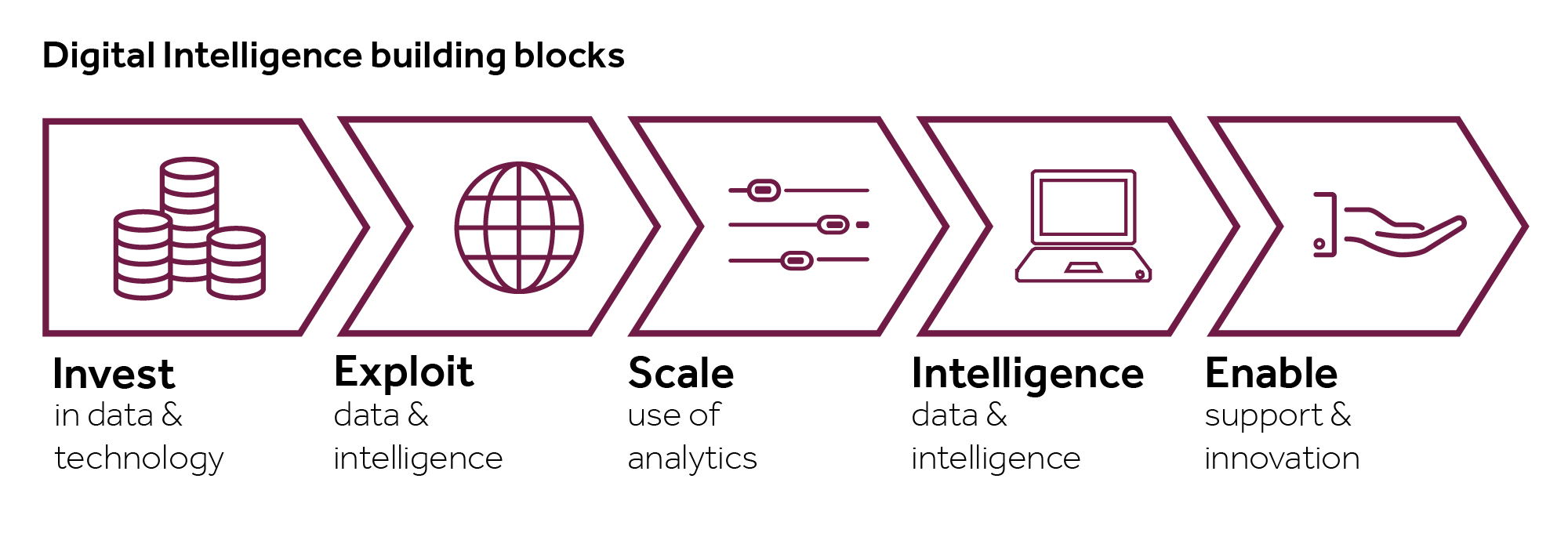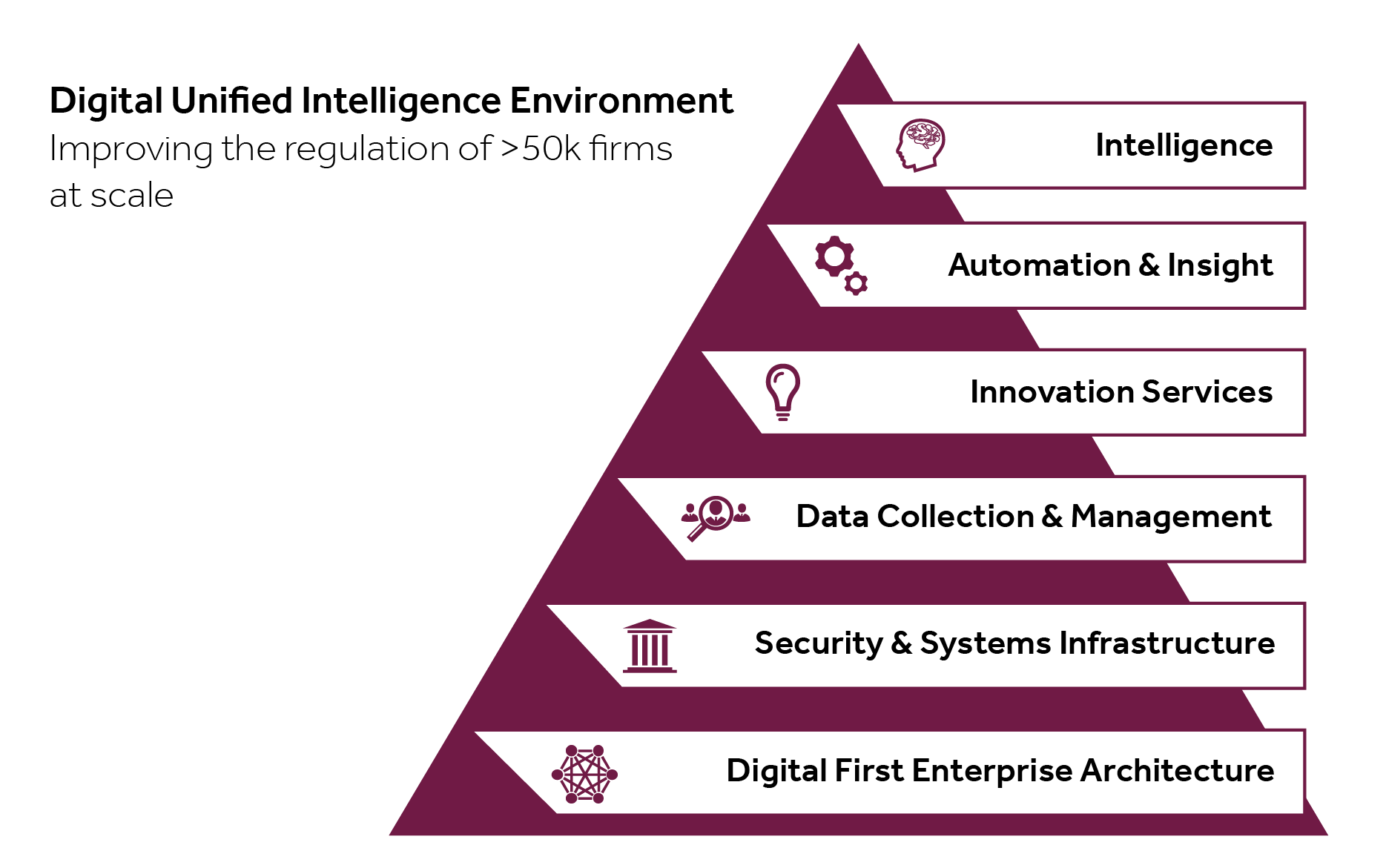This data strategy update is historical. See our latest strategy for current ways of working.
1. Introduction
In January 2020 we set out our vision for the use of data and analytics at the FCA. This update sets out where we have made progress, where we have more to do, and where we have increased our focus.
Our Data strategy is centred on making better use of data to spot and stop harm faster. We are investing in our people, technology and innovation services to deliver this.
2. Supporting our transformation
Continuing to improve how we use data and technology is helping us become a more innovative, assertive and adaptive regulator and will help us to achieve the aims we set out in Our Strategy 2022 to 2025. Our Strategy includes these themes:
3. Our progress so far
We have made significant progress in developing our technology, data services and improving how we use analytics and insights to support our decision-making. We have underpinned this with investment in our people and infrastructure.
3.1. Deepened our understanding of markets and consumers
We have created Data Science Units across the organisation which work closely with sector experts to analyse risk, triage cases and automate processes. This will result in harm being detected more quickly to protect consumers.
We have combined social media and information that is available online to increase our understanding of how firms market products and services to consumers online. This will help support future work as part of delivering the commitments in our strategy, which will put consumers’ needs first and enable them to help themselves.
We have introduced analytical tools to help spot and intervene when we see consumer harm. We are using advanced analytics and new sources of data to identify high-risk financial adverts. We have ensured that firms amend or withdraw these promotions to protect consumers. In 2021, 564 promotions were amended or withdrawn - double the number of previous years.
We have collected more liquidity data meaning we can monitor the risk of firm failure and act early to improve consumer protection. Since 2020, we’ve taken action on over 100 firms where we had concerns about the potential failure of the firm and the impact on its consumers. These firms had to increase capital, put new wind-down plans in place or were prevented from taking on new business. This data helps support future work as part of delivering our strategy commitment to reducing harm from firm failure.
Analytics have developed and implemented sanctions screening tools to support the monitoring of the effectiveness of a firm’s controls in identifying organisations or individuals that have been sanctioned. This has been vital in our support for ongoing work with domestic and international partners in response to the war in Ukraine.
We have published over 40 data-led publications, in areas such as complaints and mortgages, to promote transparency and influence firm behaviour and help consumers make informed decisions.
We have used web scraping to identify potential scams. We are scanning an average of 100,000 websites created every day to identify newly registered domains that show the characteristics that could be used for scams or fraud. Where we identify a fraudulent or illegal website, we publish a warning to consumers and write to the website’s registrar to request it’s taken down. From May 2021 – April 2022 we have added 1,966 firms to this list. This ongoing scanning work will be vital in supporting delivery of our commitment to reducing and preventing financial crime.
Published the final report of the AI Public Private Forum (AIPPF) – a joint initiative with the Bank of England and artificial intelligence (AI) practitioners from across regulated firms, academia and tech providers to explore the practical challenges associated with the use of machine learning / AI in UK financial markets. This will help inform future work on AI as part of delivering Our Strategy commitment to shaping digital markets to achieve good outcomes.
3.2. Becoming a digital and intelligence led regulator
View accessible version of infographic (PDF)
We have improved the management of our data to enable us to work quickly and efficiently with large, complex datasets and spot trends or areas for investigation across firms, sectors and products. The improvements include:
- Migrating our physical data centre to a cloud-based service. This will support the FCA’s vision to deliver digital services and products that are more cost-effective and scalable.
- The development of a Data Lake, a central data store for all FCA data.
- The implementation of Analytics tools, including data visualisation applications, as well as reporting tools and dashboards which help us to identify trends and spot outliers.
- Data Science tooling which provides our data scientists with the right tools to become more self-sufficient, improve the effectiveness of their models, and accelerate the time to develop insights.
- A new Decision Hub, a rules-based system which is used to store and manipulate information so it can be interpreted in a useful way, reducing triage time and manual effort to open and close cases.
FCA colleagues in Authorisation, Supervision, and Enforcement can now use our 'Single View' analytics tool. This provides a 'one stop shop' of key data and indicators about each firm and provides context for decisions on risks and where to intervene. Having one standardised view improves visibility of risk in each sector. Early business impact metrics indicate that this tool has reduced the time taken to assess low risk cases by half. Further work to continue to evolve this tool is planned for this year.
We estimate that through IT system cost-savings and the introduction of new analytics tools we have reduced the amount of time our employees spend searching for, collating and analysing data. This has led to £20m of operational efficiency savings achieved through replacing older, more inefficient systems and through time saved by staff who can work more quickly.
3.3. Improving Firm Data Collection
Last year we migrated 52,000 firms from Gabriel to RegData, a flexible and scalable data collections platform. RegData, our firm-facing regulatory reporting platform collects over 500,000 records every year. RegData is easier for both regulators and firms to use. We can make improvements and changes more efficiently and with less impact on firms. We continue to collaborate with the Bank of England and industry on improving the quality of firm data we collect. This initiative is focused on helping the FCA and PRA 'gets the data it needs to fulfil its mission, at the lowest possible cost to industry.'
3.4. Building an Innovation Culture
The FCA has built a world-leading reputation for regulatory innovation, with our programmes such as the Regulatory Sandbox copied around the world.
We offer a range of services to promote innovation in the UK FinTech market.
- The Regulatory Sandbox allows businesses to test innovative propositions in the live market with real consumers, alongside regulatory oversight.
- Innovation Pathways is our new, unified firm service that provides tailored regulatory guidance to innovative businesses, including established firms, start-ups and tech firms.
- The Digital Sandbox provides firms with access to a range of online tools and high-quality synthetic data assets to test and develop their propositions.
- FCA TechSprints foster innovation through collaboration, by bringing together participants to develop technology-based ideas and proofs of concepts to address specific industry challenges, such as Anti-Money Laundering, Financial Crime, and Environmental, Social, and Governance (ESG) Data & Disclosures.
- We have evolved our TechSprint model to support PolicySprints, to tackle complex issues that sit at the intersection of Technology, Innovation, and Finance. We held our first CryptoSprint in May 2022, followed by a further virtual Crypto sprint in June 2022.
Strengthening our digital capabilities across all business processes, using new technologies and fostering an innovative culture will support us in maturing our analytical capabilities.
4. Looking forward, 2022 – 2023 and beyond
While we are pleased with the progress we have made in our Data Strategy over the past year, changes in the external market have strengthened our resolve to continue to transform the FCA to become a digital regulator.
We are transforming our platform, building new tools, and improving our data strategy across the entire data and technology pyramid.
We are continuing to modernise our enterprise architecture to a cloud-based system, with strengthened security and operational resiliency.
While our transformation will take several years, the culmination of our efforts will see the FCA as the first global financial services regulator to build a Digital Unified Intelligence Environment.
View accessible version of infographic (PDF)
To support our vision, we will…
- Recruit a significant number of skilled roles, across AI, cloud engineering, digital technology, analytics, and data science, with a key focus on diversity.
- Improve our case management and triage processes, extending Single View to all financial services sectors (pensions, retail, wholesale, credit etc), sourcing new data and delivering data literacy training to all employees.
- Continue to collaborate with the Bank of England and industry to standardise how information is reported to us and demonstrate how we can use new technology to reduce the cost of reporting with a commitment to deliver these initiatives in 2023.
- Improve decisions at our authorisations stage by combining both publicly available and our own internal intelligence on firms and individuals.
- Ensure our people have the right skills and capabilities as well as tools by implementing new data science tools and organisational training.
- Maximise the value of the data we already hold, making it more useable, and provide the right tools to our front line to help them make better decisions faster.
- Work more effectively with our partners, to ensure we and they can more quickly identify insights from data and turn those into actions and interventions that drive better outcomes for consumers and markets.
- Find the right balance to achieving outcomes in a compliant and proportionate way, ensuring we meet the legal, policy and ethical challenges to the sharing of data.
- Make greater use of information online, including social media, to adapt to a changing world, where financial promotions are as likely to take the form of an influencer’s post as an advert in a newspaper.
5. Conclusion
We've made significant progress towards the objectives we set in our 2020 Data Strategy. Our substantial investments in new technology and our people have made a fundamental impact, helping us become more innovative, adaptive and assertive.
When we get these things right, data will flow through our organisation, transporting insights to the parts of the FCA that need it, when they need it.
When data and information is combined with what we know based on our expertise and experiences, we can drive better outcomes for consumers and markets.
We will publish further updates to explain our progress and how the outcomes we deliver continue to support the transformation vision we set out in 2021, and the priorities set out in our Business Plan 2022/23.

